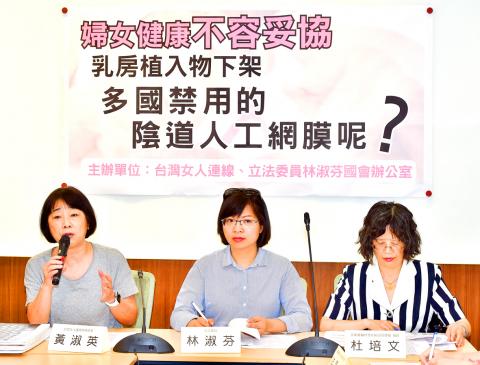Democratic Progressive Party Legislator Lin Shu-fen (林淑芬) and Women’s Link founder Huang Sue-ying (黃淑英) yesterday called on the government to ban transvaginal mesh implants and establish a registry system for medical implants.
Transvaginal mesh implants are used to repair weakened or damaged tissue in women’s bladder or pelvic areas, usually in cases of pelvic organ prolapse (POP) or stress urinary incontinence (SUI).
The US Food and Drug Administration (FDA) cleared the first surgical mesh product specifically for use in SUI cases in 1996 and for POP cases in 2002.

Photo: Tu Chien-jung, Taipei Times
However, complications including chronic pain, vaginal bleeding or discharge, pain during intercourse, urinary problems and exposure of the mesh through the vagina have been reported in many nations, triggering lawsuits in several countries.
New Zealand and Australia last year banned the use of the implants, while the UK enacted a temporary ban, and in April, the FDA ordered manufacturers to immediately stop selling and distributing surgical mesh for anterior compartment prolapse repair, citing safety concerns, Huang told a news conference at the Legislative Yuan in Taipei.
“Compared with the proactive measures taken in other nations, Taiwan is still silent on the issue,” she said.
The Ministry of Health and Welfare only changed the classification of transvaginal mesh to a third-class “high-risk” medical device in July 2017, requiring manufacturers to submit a safety report on their products every six months, Huang said.
“The government is very irresponsible. Its relaxed attitude toward regulating the manufacturers, neglecting the health risks to women who have had such implant surgery,” Lin said.
Reports of complications associated with transvaginal meshes in Taiwan increased from 59 cases in 2013 to 303 cases in 2017, and some patients might not even be aware that their discomfort could be the result of complications caused by the implants, she said.
The government needs to establish a medical implant registry system, and require that patients be informed about the possible risks associated with transvaginal meshes before having such surgeries.
Food and Drug Administration section chief Tu Pei-weng (杜培文) said the agency was aware of international safety warnings about the products and had adjusted the risk management measures on such implants.
However, a meeting of specialists that the agency held in March suggested that the reported problems in Taiwan stemming from such procedures were more due to physicians’ training and patient screening than with the products, she said.
The specialists at the meeting said that banning the use of transvaginal mesh implants would hurt women with SUI or POP, as there is no better alternative treatment, Tu said.
Given patient personal data protection regulations, registry systems are usually voluntary, not compulsory, she said.
An amendment to the Regulations for Governing the Management of Medical Devices (醫療器材管理法) that is under review at the Legislative Yuan would require the tracking of high-risk medical devices from the manufacturers, Taiwan’s Food and Drug Administration said.

Taiwan is to commence mass production of the Tien Kung (天弓, “Sky Bow”) III, IV and V missiles by the second quarter of this year if the legislature approves the government’s NT$1.25 trillion (US$39.78 billion) special defense budget, an official said yesterday. Commenting on condition of anonymity, a defense official with knowledge of the matter said that the advanced systems are expected to provide crucial capabilities against ballistic and cruise missiles for the proposed “T-Dome,” an advanced, multi-layered air defense network. The Tien Kung III is an air defense missile with a maximum interception altitude of 35km. The Tien Kung IV and V

The disruption of 941 flights in and out of Taiwan due to China’s large-scale military exercises was no accident, but rather the result of a “quasi-blockade” used to simulate creating the air and sea routes needed for an amphibious landing, a military expert said. The disruptions occurred on Tuesday and lasted about 10 hours as China conducted live-fire drills in the Taiwan Strait. The Civil Aviation Administration (CAA) said the exercises affected 857 international flights and 84 domestic flights, affecting more than 100,000 travelers. Su Tzu-yun (蘇紫雲), a research fellow at the government-sponsored Institute for National Defense and Security Research, said the air

A strong continental cold air mass is to bring pollutants to Taiwan from tomorrow, the Ministry of Environment said today, as it issued an “orange” air quality alert for most of the country. All of Taiwan except for Hualien and Taitung counties is to be under an “orange” air quality alert tomorrow, indicating air quality that is unhealthy for sensitive groups. In China, areas from Shandong to Shanghai have been enveloped in haze since Saturday, the ministry said in a news release. Yesterday, hourly concentrations of PM2.5 in these areas ranged from 65 to 160 micrograms per cubic meter (mg/m³), and pollutants were

Taiwan’s armed forces have established response protocols for a wide range of sudden contingencies, including the “Wan Chun Plan” to protect the head of state, the Ministry of Defense (MND) said today. After US President Donald Trump on Saturday launched a series of airstrikes in Venezuela and kidnapped Venezuelan President Nicolas Maduro, concerns have been raised as to whether China would launch a similar “decapitation strike” on Taiwan. The armed forces regularly coordinate with relevant agencies and practice drills to ensure preparedness for a wide range of scenarios, Vice Minister of National Defense Hsu Szu-chien (徐斯儉) told reporters before a